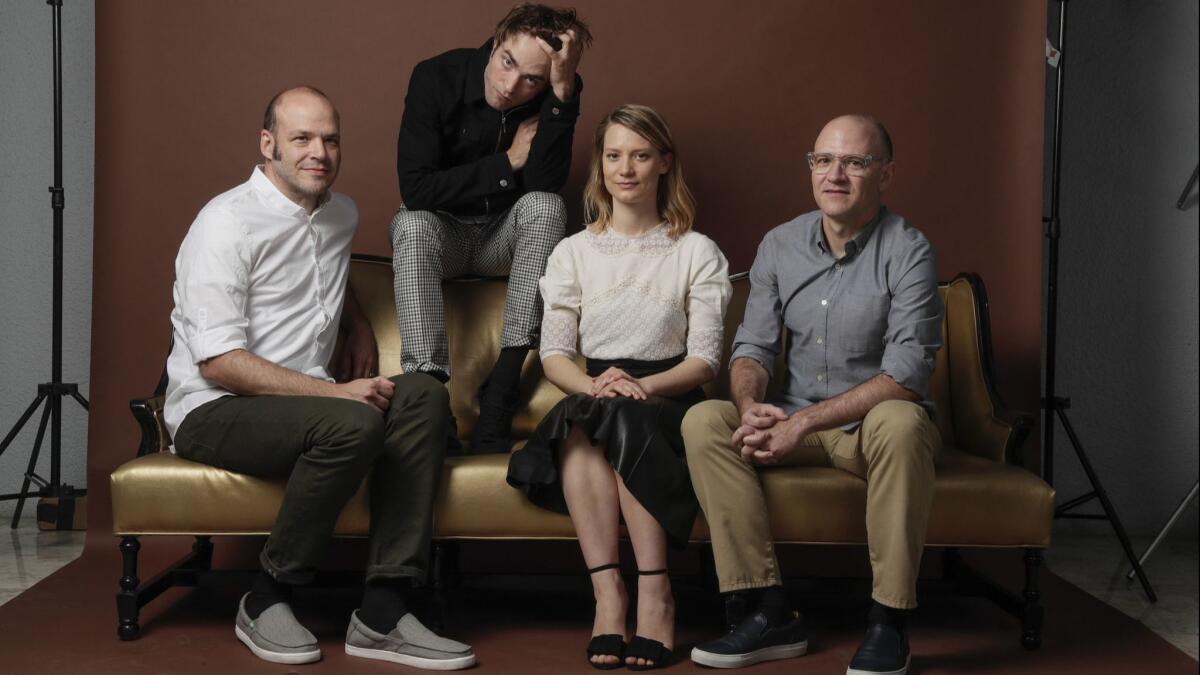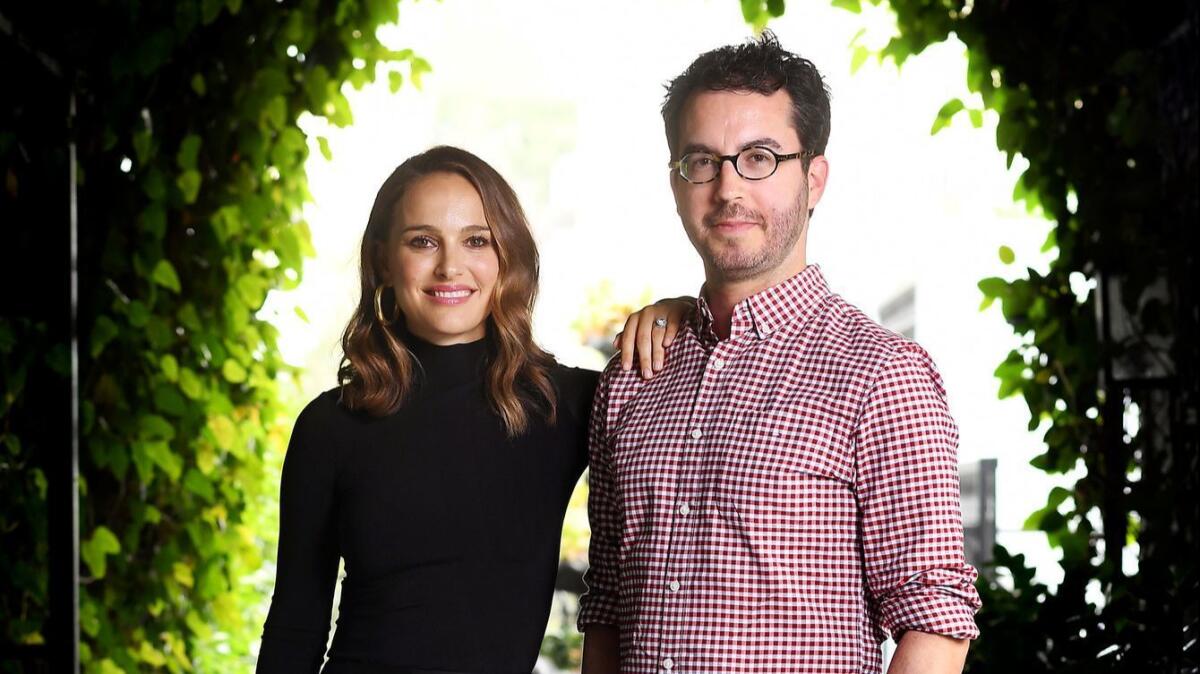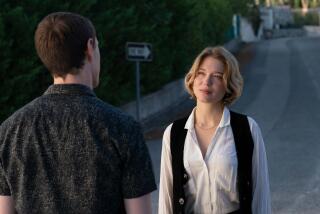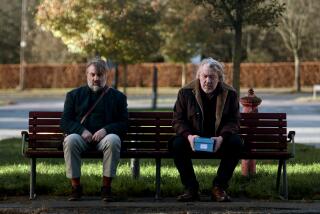Indie Focus: Finding new paths in ‘Damsel,’ ‘Half the Picture’ and ‘Eating Animals’
Hello! I’m Mark Olsen. Welcome to another edition of your regular field guide to a world of Only Good Movies.
When filmmaker Milos Forman died earlier this year, there seemed to be a tremendous outpouring of affection and tribute from other filmmakers in particular. From his early films made in Czechoslovakia to the movies he made in the United States, he blended traditional storytelling with an anti-establishment attitude that made his work always feel fresh.
The American Cinematheque has begun a tribute series to Forman, featuring some of his best known films, such as the Oscar-winning “One Flew Over the Cuckoo’s Nest,” and lesser known treats such as “Taking Off,” his first film made in the United States. But the highlight of the series may be a 35-mm screening of “The People vs. Larry Flynt,” followed by a conversation with screenwriters Scott Alexander and Larry Karazewski and the irrepressible Courtney Love, who gives a heartbreaking performance in the film.
We recently had another exciting evening with “The King,” a documentary on the cultural legacy of Elvis Presley, along with a Q&A with filmmaker Eugene Jarecki. We’ll have more screenings to announce soon, so for info and updates, go to events.latimes.com.

‘Damsel’
The filmmaking brothers David Zellner and Nathan Zellner have a sensibility all their own, oddball and sincere. Their latest film, “Damsel,” is their most ambitious yet, a satiric deconstruction of both the Western genre and masculine buffoonery. In the film, Robert Pattinson stars as a man traveling through the Old West looking for his lost love, played by Mia Wasikowska.
Reviewing for the Los Angeles Times, Justin Chang wrote that the movie “has a curious way of resetting itself — sometimes quietly, sometimes with startling force — as it proceeds along its droll, funny and somewhat plodding journey. … ‘Damsel’ is a deadpan art-western prank, a sly fusion of classical technique and postmodern sensibility. With a melancholy wink, a rich, synth-heavy score by the Octopus Project and a nod to Jim Jarmusch’s ‘Dead Man,’ it twists the narrative tropes and visual iconography of the vintage western into an elaborate cinephile goof.”
At Film Journal, Tomris Laffly called the Zellner brothers’ latest project “a revisionist western with a delicious feminist twist, [in which] the pair’s wittiness finds a perfect target in the dusty landscapes of the quintessentially American genre, with its longstanding masculine and feminine archetypes begging to be overturned.”
Reviewing for the Associated Press, Jake Coyle said “none in ‘Damsel’ are really quite up to the role they imagine themselves in, except for Wasikowka’s Penelope — the only sane person in the movie crowded with fools. Handsomely shot by Jeff Nichols’ regular cinematographer, Adam Stone, ‘Damsel’ has the look of a classic Western but a story of dopey, lost men that could just as easily be told in modern-day Brooklyn.”
And I spoke to the Zellners, Pattinson and Wasikowska for a feature that will be publishing soon.
‘Half the Picture’
The studies and articles about the lack of female directors on Hollywood movies and the difficulties for women in the industry have come with an alarming frequency over the last few years. Awareness of the issue has sadly not led to its immediate remedy. The new documentary “Half the Picture” is a sharp, digestible presentation of the issue, including a staggering number of filmmakers. Among Amy Adrion’s subjects are Ava DuVernay, Jill Soloway, Miranda July, Gina Prince-Bythewood, Catherine Hardwicke and our former Times colleague Rebecca Keegan.
In her review for The Times, Katie Walsh noted that the movie “takes those statistics and makes them human” while also hearing “from some of the highest-profile female directors working today about their experiences in Hollywood — their struggles, triumphs and the uphill battle the industry faces when it comes to creating a workforce that’s representative of our population.”
April Wolfe, reviewing for the Wrap, added “Adrion’s selection of interview subjects make the issue personal. They demonstrate through storytelling not just this rote message we’ve heard before, but also the catastrophic domino effect sex discrimination has had on careers, even the careers of seemingly powerful women like Ava DuVernay and Miranda July.”
At the New York Times, Teo Bugbee added that “though each subject professes a desire to make personal films, Ms. Adrion only sparingly asks about their style, subject matter, passions and influences. … As a result, ‘Half the Picture’ becomes an unwitting example of the impossible bind facing women filmmakers. Whether female artists submit to a rigged system or fight against it, the energy they expend on the struggle tugs them away from dreaming and creating.”
When the film premiered earlier this year at Sundance, I spoke to Adrion and producer David Harris about the film.

‘Eating Animals’
Directed by Christopher Quinn, the documentary “Eating Animals” is an adaption of the book by Jonathan Safran Foer that is produced and narrated by Natalie Portman. The movie is an exploraton of the rise of factory farming and its impact on the food we all eat.
Reviewing the film for The Times, Robert Abele said “it should be on everyone’s mind how detrimental industrialized animal-processing is to the environment. But Quinn, Foer and executive producer Natalie Portman, who narrates, aren’t out to harsh your summer barbecue buzz (well, not totally), even as they vividly take aim at factory animal farming’s well-documented evils. … The movie has a more sublime melancholy in mind, in that it openly rues a way of life lost when those who once earned a solid living working the earth traditionally, growing crops as well as humanely raising livestock, ultimately became useless to a corporatized supply chain focused on efficiency, abundance and bottom lines.”
The Times’ Amy Kaufman spoke to Portman and Foer about the film, their friendship and what it means to be, on occasion, pretentious. Of her participation with the Time’s Up activist organization, Portman said: “It’s definitely challenging, and we’re lucky to be in a place where we can have these conversations and keep trying to make it weird for people to live with the status quo. That’s the goal: To make it culturally weird to stay the way things are.”
Inkoo Kang for Slate added: “The doc essentially ends with a plea to buy more veggie burgers, with one fake-meat rep promising, ‘There’s something amazing about plants.’ So many aspects of ‘Eating Animals,’ including that line, made me roll my eyes. But the film did remind me that every meal presents the option of moral sacrifice and that a few minutes of fleeting pleasure isn’t worth torturing an animal for all its life.”
Email me if you have questions, comments or suggestions, and follow me on Twitter @IndieFocus.
More to Read
Only good movies
Get the Indie Focus newsletter, Mark Olsen's weekly guide to the world of cinema.
You may occasionally receive promotional content from the Los Angeles Times.







